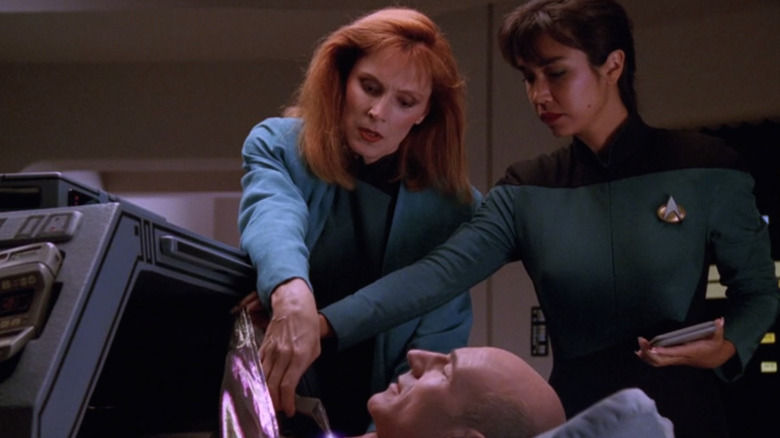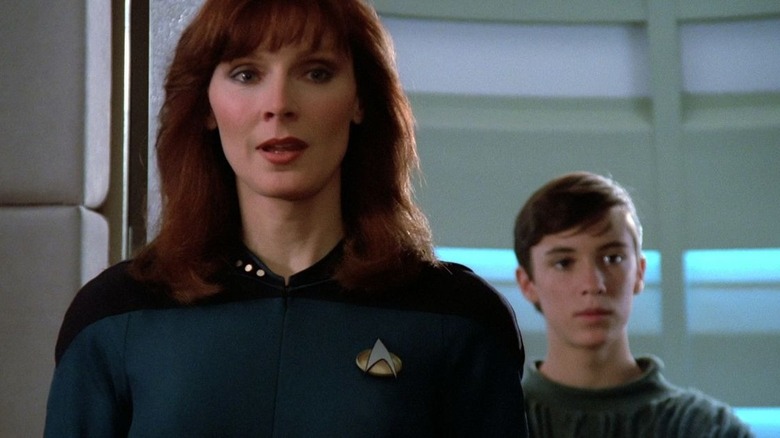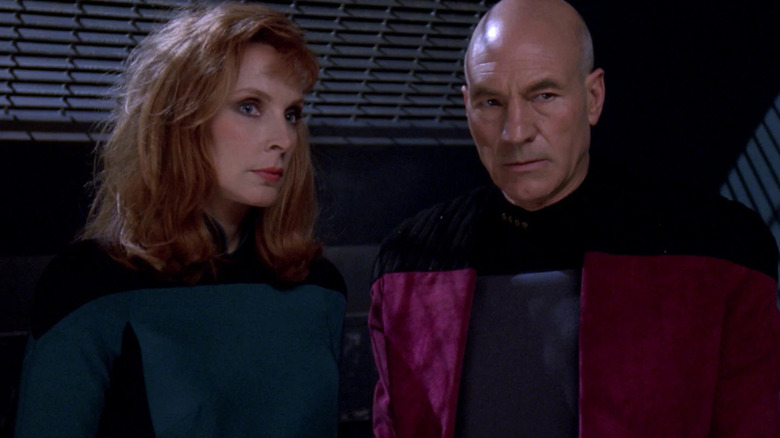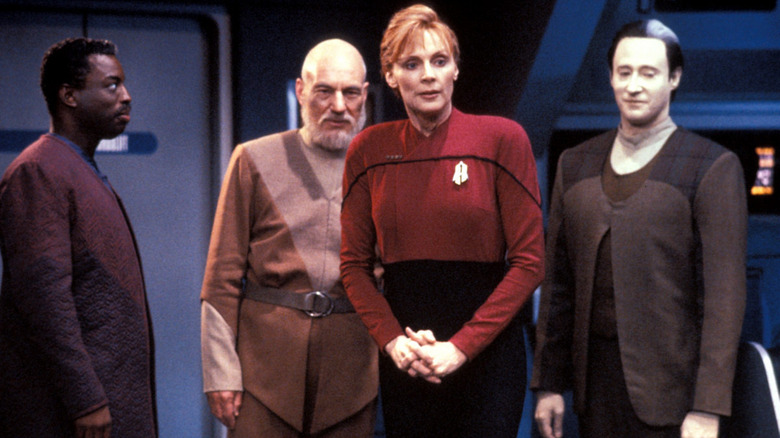What Gates McFadden Wishes She Knew Before Joining Star Trek: The Next Generation
Gates McFadden wasn't incredibly happy with the way her character was written on "Star Trek: The Next Generation." McFadden played Dr. Beverly Crusher on six of the show's seven seasons, and reprised the role for four feature films, but the arc of her character was, as she recently confessed to Scott Collura at IGN, ultimately unsatisfying.
Dr. Crusher often held the moral line on "Star Trek: The Next Generation," speaking up what is ethically sound when other characters may have been lost in personal passion or a cold devotion to diplomacy. At the start of the show, it was also heavily implied that she and Captain Picard (Patrick Stewart) were developing a complicated romance; complicated because Picard was responsible for the away mission that caused Dr. Crusher's husband's death.
The issue with playing a character that has well-developed morals and who is marked by her emotional maturity is that it is difficult to find a way for that character to grow. As such, many of the writers on "Star Trek: The Next Generation" were at a loss with Beverly Crusher. One producer in particular, Maurice Hurley, also seemed to have it out for McFadden, replacing Dr. Crusher with a much more Dr. McCoy-like character, Dr. Pulaski ("Star Trek" veteran Diana Muldaur), for the show's second season.
McFadden was open about her disappointment with Dr. Crusher.
New to Hollywood
Acting on a long-running hit show can be a blessing and a curse. One can be grateful for the high profile and the steady work, but there may also be a sense of audiences — and writers — wanting to maintain the status quo. McFadden's disappointment in the arc of Dr. Crusher came from too much of the latter, leaving her less than satisfied. "I mean, of course I wasn't," she said. "There were things that I adored that were written that I was able to do. And then there were just vast tundras." The writers seemed to want another Leonard "Bones" McCoy:
"I think obviously it was very problematic that when I wasn't there second season, and they had Diana Muldaur's character, it was very clear to me that they wanted her. They wanted someone to sort of go back to Bones. They thought that was easier to write for. And then when that didn't work out, I came back."
But even after she came back, the writers still wanted another Bones:
"But really, most of the scripts had come in and they were more that character. So it was a struggle ... on and off there would be an occasional episode that someone would have written for my character, like "Remember Me." That was fantastic. And I loved "The High Ground," where it was about terrorism. ... And that was banned in England."
What She Wish She Had Known
Looking back, however, McFadden realizes that she perhaps needed to be more active in the creative process and to learn the gentle art of schmoozing.
"I didn't understand that there is a process," she said, adding:
"So you go and you have lunch with the writers and you tell them your ideas and do things like that. I didn't realize that's what you did. And people who knew better really were able to make connections and come up with ideas. I wish I had done that. I think it would have been much smarter for me because actually the writers were all terrific, except for Maurice Hurley who was the only one I didn't get along with."
McFadden also was far more accustomed to speaking up. She majored in theater in college, and studied in Paris with Jacque Lecoq. She was a movement coach on several Jim Henson productions, including "Labyrinth." She had also paid her dues in Hollywood (well, New Jersey) by appearing in a Troma film. She was used to a more open, frank communication between producers and actors. She figures that's why Hurley had such problems with her:
[H]e got rid of me, but that's because I would speak up. If I thought something was racist or sexist, I would just say it. I was used to that, having taught at a university for years. You speak up. And that's not the way you do it in Hollywood. So I wish I'd been a little more savvy, or a lot more savvy.
All Good Things...
The final episode of "Star Trek: The Next Generation," titled "All Good Things...," was where McFadden feels everything finally fell into place. The story took us into the near future, where meet Dr. Crusher, having married and divorced Captain Picard, now captains her own starship. It wasn't just a great place for the character to end up, but was satisfying for McFadden's view of her character:
"By the end, I really was getting some beautiful Crusher scripts. Obviously, you have to share [credit]. But look at the last double episode. I mean, how beautiful was that? Every single person had a beautiful arc and it was very moving. I thought it was quite wonderful. I think it was better than some of our movies, to be honest. ... It's always a difficult thing. People want to have a big sci-fi idea, which is important. But I think our cast was also beloved because they liked our characters and the way we interacted."
McFadden is currently hosting her own podcast called "Gates McFadden InvestiGates: Who Do You Think You Are?," produced by the people behind "The Toys That Made Us" and featuring interviews with the actors and crewpeople she's worked with.



